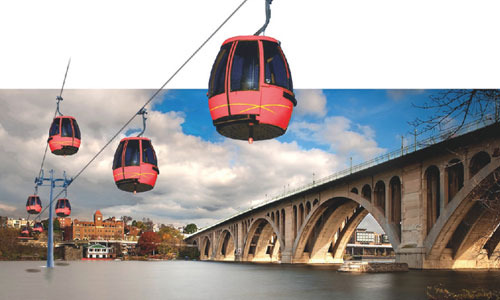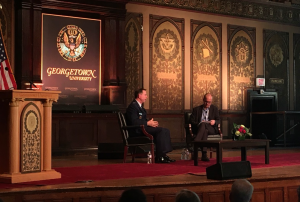Georgetown University has joined a regional coalition to support the study and construction of an aerial gondola system from Georgetown to Rosslyn over the Potomac River. As a coordinating committee member of the Georgetown-Rosslyn Gondola Commission, the university is taking the lead on organizing other coalition members to move the project forward.
The Georgetown-Rosslyn gondola would span the Potomac and is meant to reduce traffic on Key Bridge while connecting Georgetown to Rosslyn and its Metro station. The university has been an active member of the project since it began in 2016, including partially funding the feasibility study and presenting a public symposium on gondolas as transportation. The new coalition’s goal is to promote the project and garner support for it from Virginia and D.C. businesses and government.
“As one of the largest employers in Washington and home to thousands of students, Georgetown is committed to ensuring our campus community has an array of transportation options,” wrote Matt Hill, a university spokesperson, in an email to the Voice. “We joined the Georgetown-Rosslyn Gondola Coalition to represent the perspective of students, faculty, and staff who would benefit from additional public transportation options to access the university and greater metropolitan area.”
In 2016, a study funded in part by the university declared the project economically and technically feasible. The project would cost about $80 to 90 million but proponents say it will make up the cost in benefits to both sides of the river.
Just a few months after the feasibility study was released, the gondola proponents’ momentum was set back by Arlington County’s announcement in February 2017 that it would no longer fund the project. Without clear sources of funding or even a landing site for the gondola in Georgetown, the project lulled for the majority of 2017 and 2018.
Yet December 2018 saw this apparent pause of gondola-related news come to an end. On Dec. 1, Ted Leonsis, CEO of Monumental Sports & Entertainment and owners of the Wizards and the Capitals; Matt Kelly, CEO of JBG Smith; and former U.S. representative Tom Davis endorsed the project in an op-ed in the Washington Post. Soon after, Georgetown University President John DeGioia co-authored a letter with the nonprofit Federal City Council to D.C. Council Chairman Phil Mendelson asking for land to be reserved for a landing site through public-private partnerships. The announcement of the new gondola coalition followed shortly on Dec. 13.
About 40 local entities have put their name on the group, including Medstar Georgetown University Hospital, the Rosslyn BID, Chaia Tacos, and Clyde’s Restaurant Group. The university’s fellow coordinating members are the Georgetown Business Improvement District (BID) and Federal City Council.
Joe Sternlieb, president and CEO of the Georgetown BID, wrote in an email to the Voice that institutions and businesses in the area are lending their names to the coalition in support of the project and will be called on for more specific activities as the effort continues. The coalition will focus on two main tasks through this year.
“Right now the coalition is working with city leaders and FTA staff to develop a structure and plan to proceed to a federal Environmental Impact Statement,” wrote Sternlieb. “We are also working on a strategy to secure a station site on the D.C. side of the river. ”
Sternlieb wrote that the Arlington County Board has informed the coalition that the county would not oppose further investigation of the project and would act as a consultant on the Environmental Impact Statement. However, the county is sticking by its 2017 decision to not finance the project in order to focus on other high-cost infrastructure projects.
Local businesses on both sides of the river are looking to the gondola to increase customer access to the area. Ginger Laytham, CEO of Clyde’s Restaurant Group, which owns The Tombs, is organizing local business leaders to support the project. As the chair of the Georgetown BID’s Gondola Working Group, she has worked with business owners to encourage local and federal institutions to join the project.
“It is in every business’s interest to make sure that Georgetown, where our flagship restaurant is located, remains accessible, interesting and vibrant,” wrote Laytham in a statement to the Voice.
Around campus, supporting the gondola is just one strategy the university has used to promote alternative transportation.
“Georgetown has made significant investments in programs like bike share discounts, car sharing and free shuttles to Metro stations,” Hill wrote. “[The gondola is] an expanded mode of transportation that would make the university and commercial district more accessible, relieve road congestion, and reduce pollution.”
Georgetown students on campus now are unlikely to see the fruition of the coalition’s work–even if the group manages to overcome the inherent structural and financial obstacles of building an aerial gondola over the Potomac, construction will take around four years to complete. Despite these hurdles, the university’s leadership position in the coalition indicates it believes the Georgetown-Rosslyn gondola will be a worthwhile, long-term investment for the community.








What would a ground-based gondola system look like, and is it being considered as an alternative method of transporting citizens across the Potomac? As a concerned member of the community, I am eager to know!
Dumbest. Idea. Ever. Classic – and sad – example of our leadership putting feels before metrics. I’m so sick of this virtue-signaling class and it’s feckless, stupid (yes, stupid) leadership.
Georgetown needs a Metro stop. Period. Nothing else will make a dent in traffic. Not bikes shares, scooters, and certainly not gondolas, which will end up being nothing more than a tourist attraction, not a real form of transport. Prove me wrong – show me the data that says 1) there is a commuter – not political or “urbanist” – demand for a gondola and 2) that it will move more people than the current alternatives.